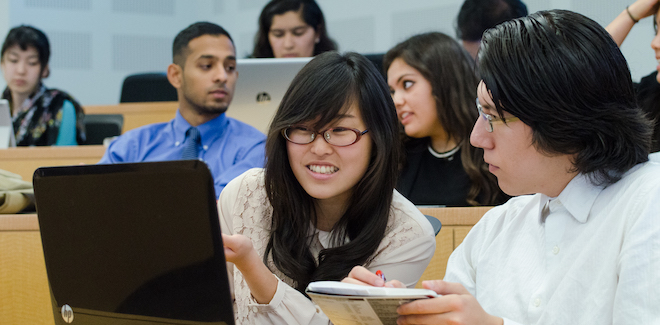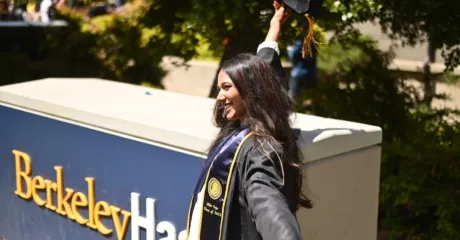Andrea Licata started off her college journey at the University of California, Irvine, in the humanities department, under the recommendation of her high school guidance counselor. According to her guidance counselor, she was a good writer, Licata recalls. But after enrolling, Licata decided to major in economics and by the end of her first year, she realized that her true calling was in business administration at the Paul Merage School of Business and applied. Since then, she’s never looked back.
Licata’s story isn’t unusual at the Merage School. Though there are over 80 majors to choose from at UC-Irvine, more students request to transfer to the Merage School than any other.
Licata says her time at Merage was so rewarding that the Orange County, California, native is now working as an academic counselor to undergraduate students with undeclared majors at UC-Irvine.
“When people ask about my experience at Merage, I tell them that it’s like being on the fast track to successful careers with extremely driven people,” Licata explains. “But along the way, there’s a sense of camaraderie from having stayed up late together, worked in teams together, and planned our careers together.”
A DIVERSE EXPERIENCE AND COMMUNITY, WITH A TECH-FOCUS
At the Merage School of Business, students are being prepared to lead in the digital world. This means that students are not only equipped with skills to handle the latest technology and observational skills to predict trends, they also get the opportunity to experience and engage the global society in a safe space. What’s more, some 30% of the undergraduate student population at Merage School is made up of underrepresented minorities and diversity remains one of the priorities the school is working on. Gaining admission to Merage is not a sleepwalk. More than 11,000 high school students apply each year. This year, more than 2,100 were accepted, for an acceptance rate around 20%. Yet, the school continues to prioritize its diversity.
“I had international students in almost every class and we had many teamwork projects,” says Vannie Luong, who also graduated in the Class of 2015. “It was a definite struggle to communicate but the experience really prepared us to work with international business partners.”
In some cases, Luong, who specialized in general management with a minor in international studies, says that her classmates had difficulty with social media campaign planning as the concept was new to them. They shared with her the cultural influences on the marketing landscape in their home countries, and the Santa Ana, California, native shared her exposure to social media tactics widely used in the San Francisco Bay Area.
The Merage School curriculum is designed to broaden the perspectives of students and train them to constantly rethink context and strategy in their use of technology. Professor VC Choudhary, Associate Dean of Undergraduate Programs at the Paul Merage School of Business, says that the number of students majoring in business administration has grown by over 50% from the year before to almost 1,000.
“The economy is changing to become more technology driven and we strive to prepare students holistically for this,” Choudhary explains. “Over the next few years, our population will likely continue growing because of the extraordinary demand.”
BUSINESS ANALYTICS MAKING A PUSH AT MERAGE
Merage currently offers a Bachelor of Science in Business Information Management program and a Bachelor of Arts in Business Administration program to undergraduates. The Information Business Management program is a collaborative, interdisciplinary degree program co-administered with the Donald Bren School of Information.
In an increasingly global and information-centric world, the program teaches students to understand and apply theories and concepts on computing, informatics, business fundamentals, and analytical decision-making.
Choudhary says that the capped major accepts 40 students per year and equips them with a foundation in computer science on top of business classes at the Merage School and analytical classes across campus.
In the Business Administration program at the Merage School, students pick at least one of seven areas of emphasis to focus on. Those areas are accounting, finance, health care management, information systems, marketing, operations, and decision technologies, and organization, and management.
Students are required to complete ten business courses for a foundation in essential core business competencies, and a minimum of ten business electives selected from emphases.
“All upper-level courses required project and team-based work, thus promoting the school’s goal of a collaborative learning environment,” Luong, who now works as a project coordinator and marketing assistant at UC-Irvine, says. “Some courses even took it further to allow experiential learning and simulations.”
Licata recalls a particularly memorable experience where she and her classmates were assigned roles like the “adventurer,” “photographer,” and “wildlife detector” to play in a digitally simulated Mount Everest climb.
“In the computer simulation, a storm happened and each of us had our own motives. We had to apply principles we had learned to survive, but most of us died along the way,” she admits. “We learned about what would happen in the real world if we chose to compromise instead of collaborating and improving our communication.”
LESSONS FROM THE UNITED NATIONS AND FOOD TRUCKS
With their eye on the global marketplace, the leadership at Merage have also emphasized experiential learning in the curriculum. Students must either participate in the University’s Education Abroad Program or take an international business course to graduate. And while demanding, students like Licata say that the requirement equipped them with skills necessary for every business person.
Licata, who graduated with emphasis in marketing and organization and management, attended an international business law class that culminated in a project where students developed business plan proposals to help companies go global. “I learned a lot about international laws and barriers to international expansion and am now able to make quick but thorough decisions when doing business internationally,” she explains.
Many of the professors on the Merage faculty are also professionals in their field outside of their teaching careers. This translates into students often working with up-to-date industry issues that their professors experience in real-life.
Take William Hernández Requejo, who is the executive director of the Center for Global Leadership and also faculty at the Merage School, for example. On top of teaching the school’s International Management class, Requejo is also serving as a foreign investment negotiations expert for the United Nations in foreign investments in Cuba. In his class, students monitor events around the world and compare economic, political, and social conditions over time to study and discuss how decisions made in history would be different if made today.
“We believe that trade engenders peace and the more we trade, the less wars we’ll have,” Requejo, who has been teaching the class for the past decade with his experience in strategic alliances and joint ventures, says. “We’re also working on sending students to countries like Prague, Russia, and Czech Republic to experience information as it happens first-hand.”
On top of experiential learning in the classroom among peers, Merage also endeavors to have their students engaged in the community before joining the workforce. While studying about marketing and branding, Licata says that a professor who had managed brands including McDonald’s and Kraft Foods chose to have them create marketing analyses and strategic plans for local food truck businesses instead of writing papers and taking an exam.
Working in groups of seven, Licata and her teammates interviewed and observed the owners and customers of Kogi BBQ Taco Truck. The iconic Los Angeles- and Orange County-based food truck claims to have started the Korean Mexican taco movement. To understand the business, Licata’s team spent almost 15 hours studying how customers interacted with Kogi’s products to collect data on what the business did well and needed help with.
“We noticed they didn’t have enough napkins. It’s a small thing but can make or break an experience,” she says. “We studied how people moved their bodies around the food and the messages they could be sending out. The experience made us apply theoretical business principles to the real world ”
TOP EMPLOYERS INCLUDE PwC, E&Y, AND DELOITTE
With their dedication to building a globally educated student population, students at the Merage School graduate with skill sets that make them highly attractive to employers. Among the top ten employers of Merage graduates are PwC, Ernst & Young, and Deloitte as students tend to enter the audit and tax industry.
For Rouzbeh Soleymani, who also graduated in 2015, his four years at UC-Irvine translated into a six-figure job offer in Tehran, Iran. Soleymani, who majored in accounting and finance, took on six full-time internships and three part-time internships while at Merage. Today, he is working on his law degree at UC Irvine’s School of Law.
“We teach our students to focus on creative and strategic thinking to be able to understand business challenges, identify opportunities and create value with technology,” Choudhary maintains. “It’s about helping them adapt to the changing future.”










